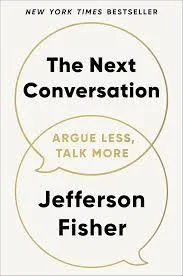
The Next Conversation, Part Four
Lead with Wonder: How Curiosity Calms the Storm
Rule Three from The Next Conversation by Jefferson Fisher.
So far in this series, we’ve covered two of the most underrated superpowers in hard conversations:
Saying it with control — Stay calm before you respond.
Saying it with confidence — Own your message without shrinking or shouting.
Now we’re diving into the magic-maker of real connection:
Rule Three: Say It with Curiosity.
This is the moment where you stop trying to win and start trying to understand.
Why Curiosity Changes Everything
When a conversation turns tense, our default brain response is often:
Defend.
Prove.
Win.
But curiosity shifts us out of defensiveness and into collaboration. It opens doors, lowers walls, and helps us discover what’s actually beneath the surface of someone else’s behavior.
Jefferson says curiosity is what turns confrontation into conversation.
Curiosity Replaces Assumptions
Jefferson’s Advice: Don’t lead with “Why did you do that?” Lead with “What’s going on for you right now?”
Assumptions are fast, easy, and often wrong. When we assume, we create a story about the other person without checking if it’s true.
Instead of immediately assuming, try this:
“Help me understand what made you feel that way.”
“Can you tell me more about your side?”
“What happened before this that I might not know about?”
This isn’t letting people off the hook. It’s inviting clarity before correction.
Curiosity Disarms Defensiveness
Jefferson’s Advice: When people feel safe, they’re more likely to be honest, and less likely to explode.
If someone expects you to judge or attack them, they’ll brace for a fight. But curiosity is like telling their nervous system, “You’re not under attack. I’m listening.”
Instead of attacking, try this:
“That didn’t sit well with me. Can we unpack what happened together?”
“I’m open to hearing your experience, even if it’s different from mine.”
“Can you walk me through what you were feeling in that moment?”
This kind of language creates safety. And safety leads to honesty.
Curiosity Makes Space for Growth
Jefferson’s Advice: If you want someone to change, let them feel seen first.
Jefferson reminds us: people rarely change because we pressured them. They change when they feel understood and are then invited into something better.
Instead of pressuring for change, try this:
“If we could do that over, what would you want to say differently?”
“How can we make this feel better next time—for both of us?”
“What do you need from me to feel more supported?”
Now you’re collaborating, not just correcting. And that’s where growth happens.
Real-Life Scenario: The Teen Who Snaps Back
You ask your teen to clean their room, and they snap, “You don’t get how stressed I am!”
Old response:
“Don’t talk to me like that. Clean your room now.”
Curious response:
“That felt really reactive. What’s going on with you right now?”
“I get the sense you’re overwhelmed. Want to talk about what’s piling up?”
You’re still addressing the behavior, but now you’re also addressing the human behind it.
Takeaway
Saying it with curiosity doesn’t mean you’re being soft. It means you’re being smart.
Because when people feel heard, they hear better too.
Let go of proving. Drop the script. Get genuinely interested in what the other person is feeling, fearing, or needing.
You might be surprised at what opens up.
NEXT UP: SAY IT WITH THE GOAL IN MIND